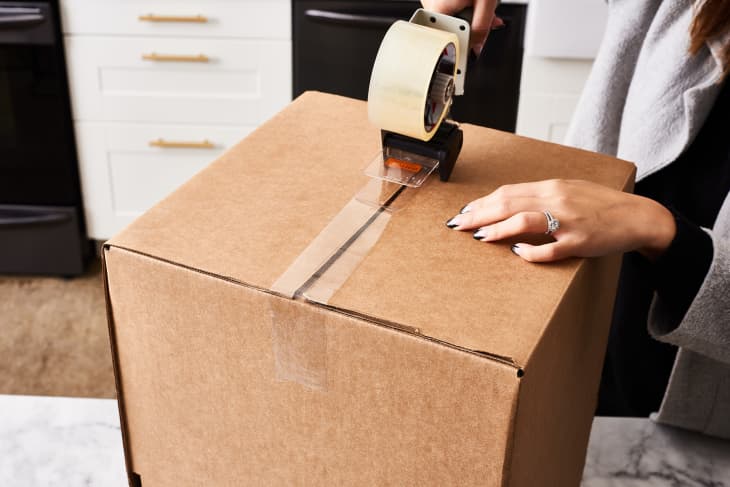5 Decluttering Tips to Try Before Your Next Move, According to Pro Organizers

After living in our current apartment in San Diego for six years, my husband and I will be moving to my hometown of Los Angeles next month. As excited as I am to make this move, I have inevitably become stressed about the upcoming process of moving and what I’ll need to declutter in this space I’ve called home for quite a few years. I have begun to ask myself what exactly I should keep and, most importantly, how do I know what to declutter?
“Moving to a new home can be exciting and a fresh start, but it is also one of the top stressors a person can experience,” says Jill Yesko Diana, professional organizer and founder of Discover Organizing. “It is not only the logistics of relocating your furniture and possessions from one place to the next, but also the process of planning the move and deciding what will fit into your new home’s floor plan.”
After looking around my apartment and taking some inventory, I figured I’d reach out to some professional organizers for some tips and insight. After getting their advice, I felt reassured and motivated to focus on decluttering and packing while still reminiscing about the old and looking forward to the new.
Here are their recommendations.
Don’t buy packing items — sort of.
With the cost of packing supplies, decluttering before you move can make a significant difference. Aaron Traub, professional organizer and owner of Nola Organizers, recommends first getting some boxes for specifically decluttering, not packing. Once you’re done decluttering, you can reuse whatever boxes you have left and then buy any packing supplies you still need.
“Label some of these boxes as ‘donate’ and others as ‘trash,’” he says. “Go room by room and ask yourself these questions as you declutter: Do I need this? Will I use this at the new house? Would I rather have the space or this item at the new house?”
Adjust your mindset.
Matt Paxton, downsizing and cleaning expert, television host, and author of Keep the Memories, Lose the Stuff, says that adjusting your mindset when it comes to time, price, and sentimentality may be difficult, but is necessary when it comes to decluttering and making that big life change.
“Ask yourself: ‘Is this item for my real life or my fantasy life’? This means those ice skates you haven’t used in 10 years might not be needed in Miami,” he says. “Also, if you haven’t used certain items since the pandemic, you probably won’t again. If you got really into knitting during 2020, but haven’t touched those supplies since, it’s OK to donate all of it.”
Additionally, sentimentality and guilt are especially powerful grips that Paxton says can be detrimental to letting go and moving on.
“Instead of thinking ‘This was expensive,’ or ‘This was a gift,’ try ‘Someone else could really use this,’” he says. “If you are keeping the item solely because you spent money on it and not because you actually use it, does it make sense to double down and spend money to move it again and still not use it? Know that someone else could truly use it and enjoy it more than you do.”
Enlist your family and friends for help.
Moving is a stressful and laborious task, but Diana says that you may need your family and friends’ help to not necessarily lift and wrap things, but rather get a second opinion on decluttering certain items.
“If you are decluttering and packing things alone or with someone you live with, you might make excuses for keeping some things you haven’t used or don’t need, while your loved ones can help keep you honest and accountable,” she says.
Prioritize high-quality pieces, even if you don’t have them yet.
Both Traub and Paxton agree that focusing on the quality of the things you’re decluttering or keeping is imperative. That might mean buying a new item instead of holding onto an older piece because you’re attached.
“If you personally put a piece of furniture together, make sure that it doesn’t cost more to move it than it would to donate or sell it and buy a new one on the other side,” says Paxton.
When moving to a larger place, Traub suggests prioritizing quality over quantity when choosing items that align with your desired lifestyle. For a smaller space, he says it’s best to focus on downsizing by decluttering unused or unneeded items and opting for multifunctional pieces to maximize space and storage in your new home.
Remember the person, not the item.
Paxton says all of his clients have a difficult time letting go of things, particularly before moving. He recommends the Artifacts app to his clients as a digital method to preserve the sentimentality of items, making it easier to move forward with decluttering.
“Just remember that you love the people attached to those items, not the items themselves,” he says. “If you are having a hard time letting go of your kids’ rudimentary art, then take pictures of it and have your kids tell you about it. If you continue to tell the stories, then people live on forever, so their stuff doesn’t have to.”